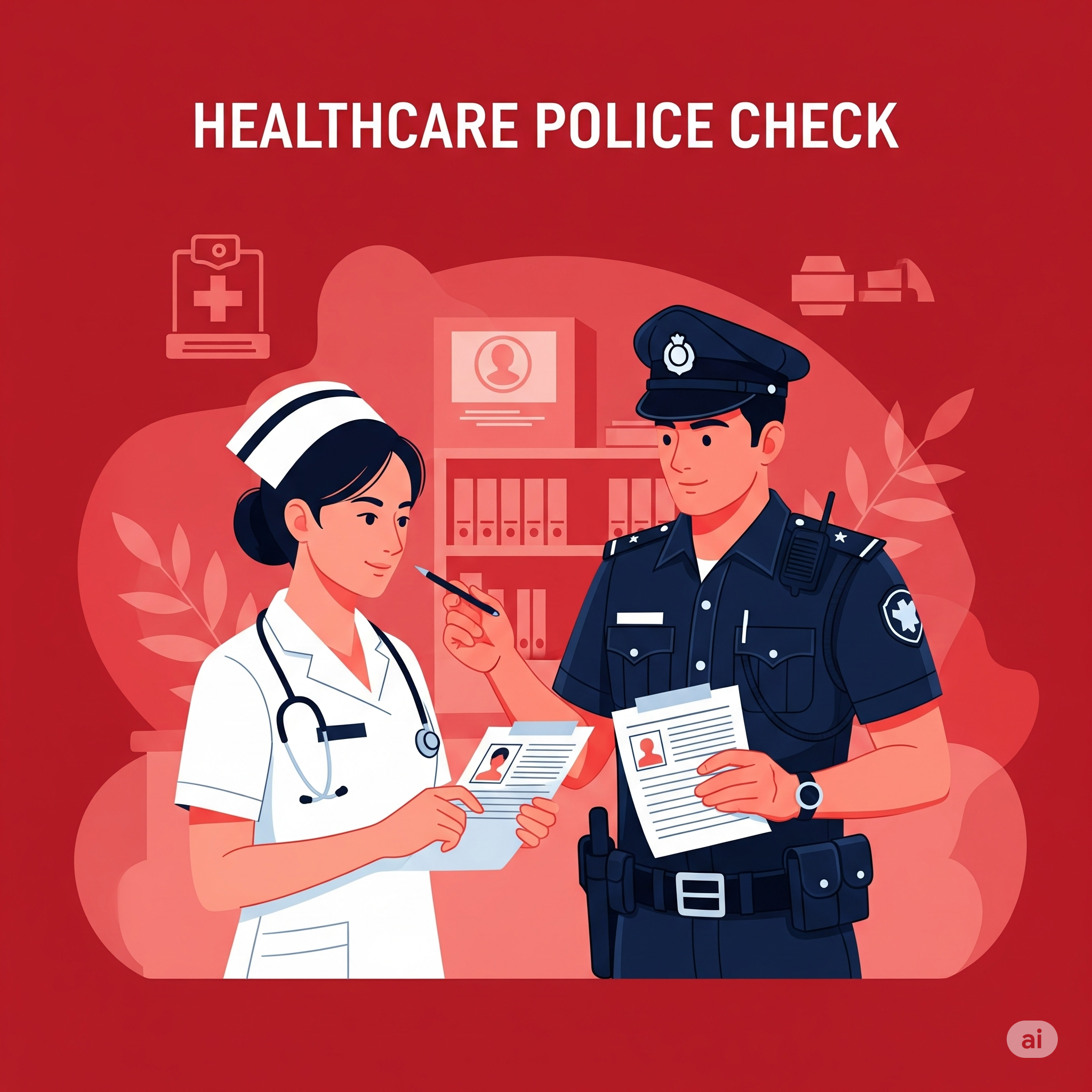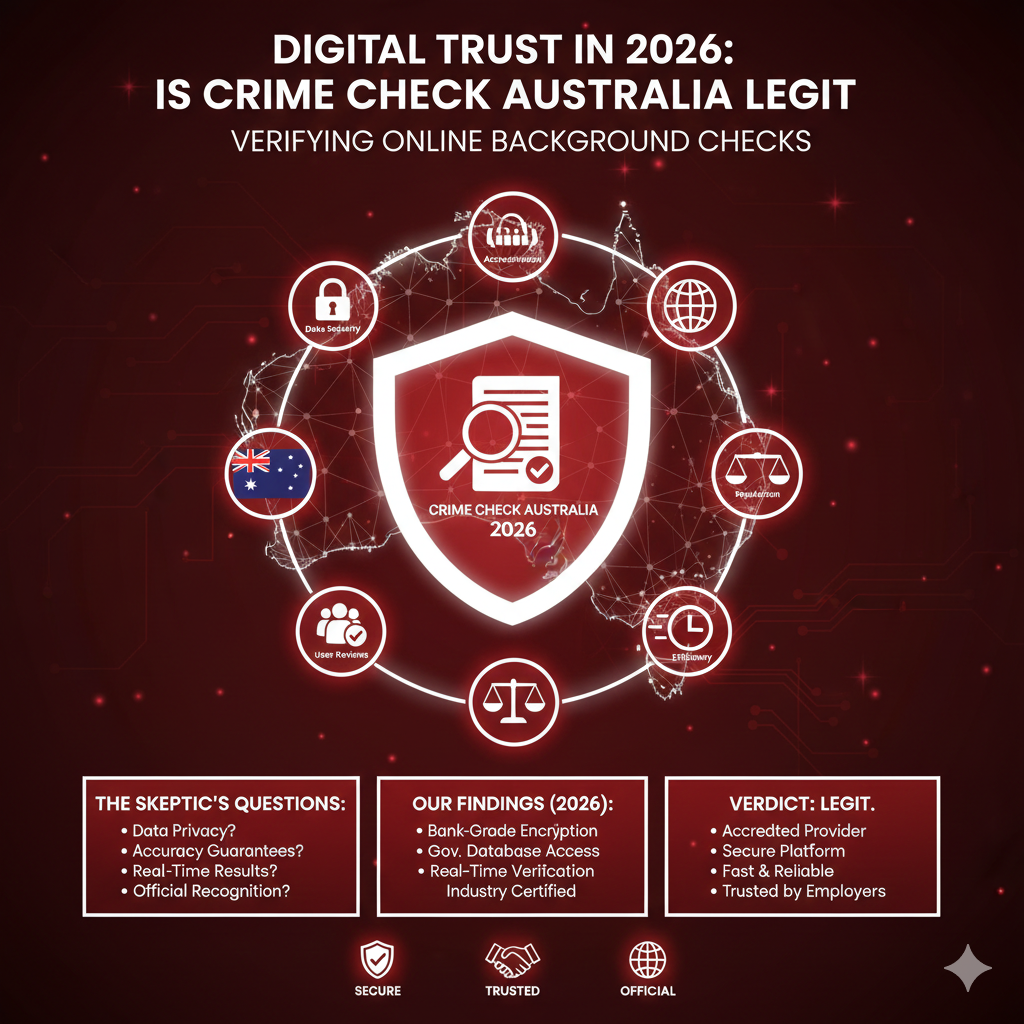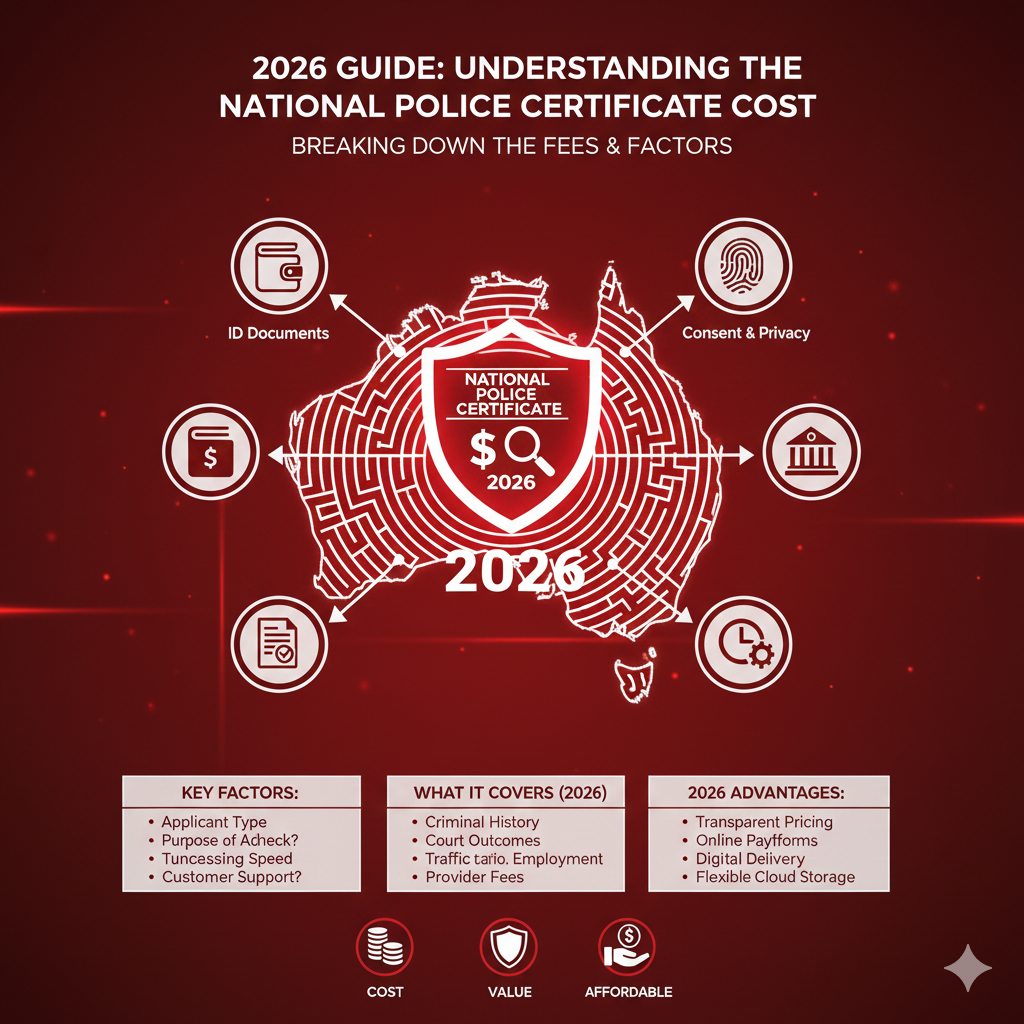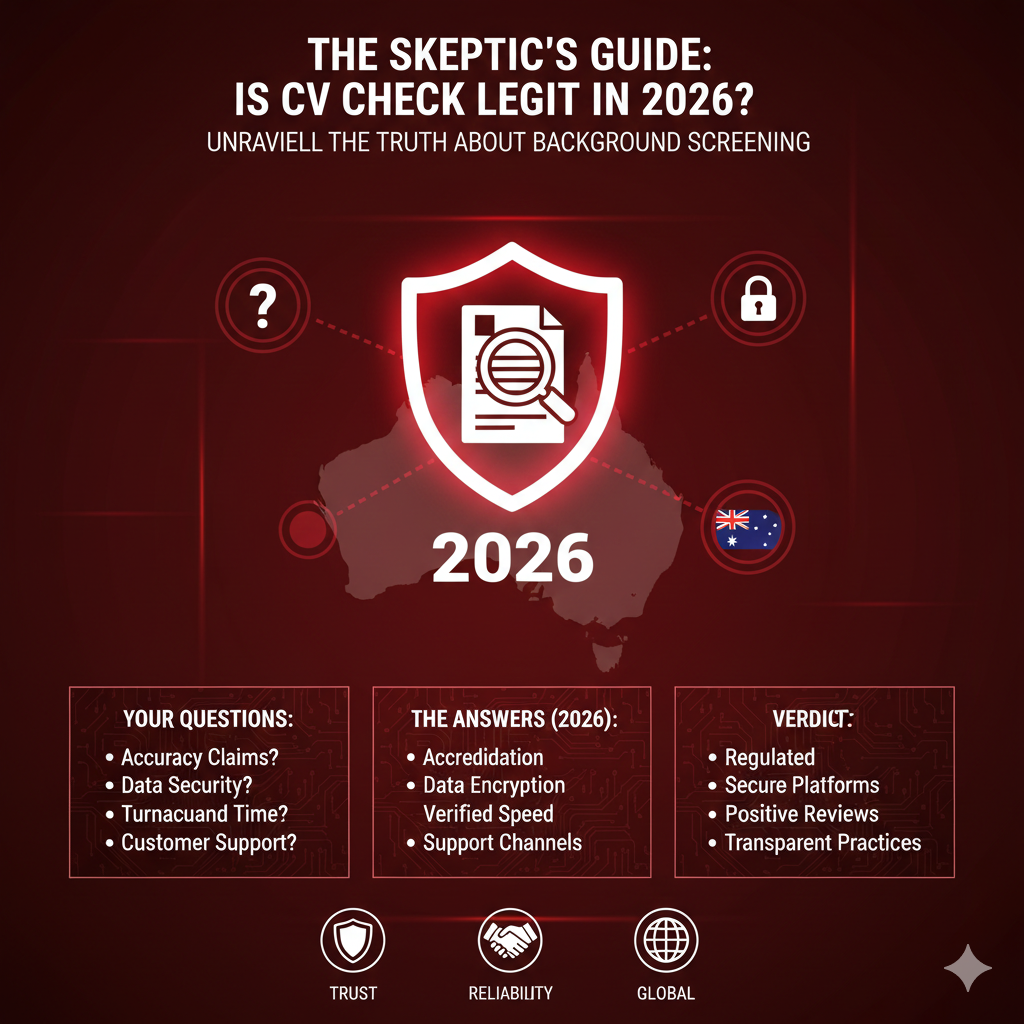The importance of safety and trust in the healthcare sector cannot be emphasized. Whether you’re hiring nurses, doctors, medical assistance personnel, one of the most important aspects of the hiring process is the health care police check.
However, is it required by law? Or just a proposed best practice? This lesson covers the importance of police checks, whether they are mandatory or optional for Australian healthcare workers, and how they protect patients, staff, and healthcare providers.
What Is a Healthcare Police Check?
A healthcare police check is one type of Nationally Coordinated Criminal History Check that searches for criminal crimes that are disclosable, such as past convictions, court appearances, and current charges. On behalf of the Australian Criminal Intelligence Commission (ACIC), these investigations are managed by accredited agencies such as Rapid Screening.
This check is typically required for:
- Employees at assisted living facilities
- Disability assistance workers eligible for the NDIS
- Nurses and doctors
- Allied health practitioners
- Medical administrative staff
- Volunteers in healthcare settings
Making sure the patient is safe is the main objective, especially for vulnerable groups including children, the elderly, and those with disabilities.
Is a Healthcare Police Check Mandatory?
In fact, in most healthcare settings, a healthcare police check is required. Due to a number of laws, industry-specific regulations, and company policies, all healthcare personnel are required to submit to a police check before starting work and often on a continuing basis.
Key Legal Requirements Include:
- Aged Care Act of 1997: The law requires volunteers and employees to possess a current national police certificate that was obtained no more than three years ago.
- NDIS Worker Screening Check: Although a comprehensive examination of an individual’s criminal history is necessary for the NDIS Worker Screening Check, it is not the same as a routine police check.
- State-Based Health Authorities: Pre-employment exams are frequently required by state-based health authorities for positions in hospital and community care settings.
- Private Healthcare Firms: Private healthcare firms may establish internal rules requiring police checks to be updated on a regular basis.
Why Healthcare Police Checks Are Essential
1. Protecting Vulnerable People
Patients who are weak physically or mentally are frequently around medical professionals. A healthcare police check helps make sure that these employees don’t endanger the safety and well-being of the people they are responsible for.
2. Risk Mitigation for Employers
Healthcare organizations run a serious danger of financial fraud, abuse, and negligence when they hire someone without doing a complete background check. The first line of defense in risk management procedures is a police check.
3. Building Public Trust
The healthcare industry depends heavily on trust. Patients want to know whether the caregivers have undergone screening and approval. By demonstrating professionalism and a commitment to safety, requiring police inspections enhances an institution’s reputation.
When Should These Checks Be Conducted?
Instead of being an afterthought, police checks ought to be included into every stage of the recruiting process. The candidate must submit and pass a recent police check before beginning work.
- The Aged Care Act requires healthcare workers in certain roles to renew their police checks every three years.
- After a major incident, if concerns arise about a staff member’s behavior, the organization may require an updated police check.
- Continuous employment: Many firms have policies that require regular re-checks to ensure continued compliance.
What’s Included in a Healthcare Police Check?
It provides a thorough summary of an individual’s criminal history in every Australian state and territory. The following results might become apparent:
- Court decisions
- Pending charges
- Major driving-related violations
- Employers verify whatever credentials the role requires.
The level of disclosure will depend on the nature of the function and any exemptions or legal protections, like the Spent Convictions Scheme.
Who Needs a Police Check in the Healthcare Sector?
A police check is necessary for many jobs in the healthcare sector in order to safeguard the security and confidence of both patients and staff. Organizations closely examine not only medical personnel but also administrative and support staff.
The following roles require a healthcare police check:
- Every nurse in practice needs to be a registered nurse.
- Employing elder care workers is required by the Elder Care Act.
- Disability Support Workers must go through a police check and screening (NDIS).
- Because they have access to sensitive patient information, hospital administrative personnel are essential.
- Jobs involving patient interaction and data handling require medical receptionists.
- Volunteers are essential for healthcare safety compliance screening, and even for free positions.
- Medical centers demand maintenance because of accessibility to clinical and patient areas.
- Private professionals, such as dentists and general practitioners, need to pass background checks so they can legally practise.
How to Get
Obtaining a health care police check can be simple when you work with Rapid Screening, an ACIC-accredited company.
Steps:
- Visit rapidscreening.com.au online.
- Select the “Healthcare/Medical” industry check to make the correct choice.
- Present yourself.
- Send in your application.
- You will often receive an email with the results in a day or two.
A trustworthy provider will complete your check quickly, securely, and in full compliance with Australian privacy regulations. If you want to know more then contact us.
What Happens if a Record Is Found?
If a criminal record is discovered during an applicant’s police check, firms have to decide if it is significant to the role.
- The nature of the offense
- What was the duration of that event?
- If it displays a specific behavior
- If it would impair the individual’s ability to care for patients
Employers must connect their responsibility of care with equitable hiring procedures and prevent unlawful harassment based on irrelevant records.
Why Choose Rapid Screening for Healthcare Police Checks?
Rapid Screening is one of Australia’s most credible and reliable background check organizations, especially for the medical industry. We commit to delivering a smooth, secure, and fully legal screening process tailored to your needs, recognizing the unique compliance requirements healthcare professionals face.
Physicians, nurses, and healthcare organizations nationwide make use of rapid screening for the following reasons:
- Quick Turnaround Times: We understand the value of integrating new hires on board as soon as possible. We place a premium on timeliness in order to assist you with preventing hiring and staff delays. Authorities process and send out many police checks within a single day.
- Fully Authorized by ACIC: The fact that Rapid Screening is an ACIC-accredited business ensures that all of our checks adhere to stringent regulatory specifications. This guarantees that your findings are correct, validated, and in line with Australian law.
- Nationwide Coverage: Rapid Screening ensures compliance across all Australian states and territories—whether your healthcare facility operates as a private clinic, a large urban hospital, or an aged care center in a rural area. Even in Victoria (VIC), New South Wales (NSW), Australian Capital Territory (ACT) and beyond.
- Secure, Real-Time Status Tracking: Employers and HR departments can keep an eye on the status of checks in real time with our easy-to-use web portal. Every applicant’s status will be fully accessible to you, and you will be notified in real time as soon as the results are in.
- Continuous Assistance for Medical Professionals in Adherence: In addition to conducting police checks, we also offer committed compliance management support. In order to create screening protocols that satisfy industry-specific standards and legal criteria, our team works closely with healthcare facilities, aged care providers, and allied health businesses.
Rapid Screening speeds up the screening process, saving you time, lowering risk, and guaranteeing complete compliance at every stage, whether you’re an HR coordinator managing dozens of clinical staff or a lone practitioner handling your own credentials.
Conclusion
The healthcare industry avoids shortcuts because the law requires thorough procedures, and doing so is essential for maintaining public trust, organizational integrity, and patient safety.
Healthcare facilities and individual staff greatly benefit from conducting police checks regularly, fairly, and accurately. In most cases, the law also requires it.
Frequently Asked Questions (FAQs)
Q. Does Australia’s law mandate that all healthcare staff undergo a police check?
Yes. The law mandates police checks for most healthcare occupations, especially in hospitals, assisted living centers, and elder care facilities. Authorities enforce this requirement through various legislation, including the Aged Care Act of 1997 and state-level health standards.
Q. How frequently must police checks in the healthcare industry be renewed?
Probably every three years. Organizations must update positions governed by the Aged Care Act or other state statutes every three years. However, depending on their own risk management criteria, organizations could require more frequent inspections.
Q. Can I work in a healthcare setting if I have a criminal record?
The type of offense will determine this. The conviction’s relevance to the position will be evaluated by the employer. Serious or recent transgressions, particularly those involving harm or dishonesty, may disqualify a candidate but minor, unrelated offenses would not.
Q. Do a conventional police check and a healthcare police check differ from one another?
No, a nationally coordinated criminal history check is the same as a core check. However, the healthcare industry evaluates its implementation differently, placing greater emphasis on patient safety and an employee’s fitness for tasks involving vulnerable individuals.
Q. Do hospital administrative staff need a police check?
Yes. Clinics and hospitals usually require even non-clinical staff—such as administrative personnel, medical receptionists, and IT personnel with access to sensitive information—to undergo a police check to meet organizational compliance.
Q. Can employees in the healthcare industry use the same police check for more than one employer?
Not usually. Although the police check is valid nationwide, employers may request a new one depending on their policy or the date of the previous one. Verifying with each company is the best line of action.




